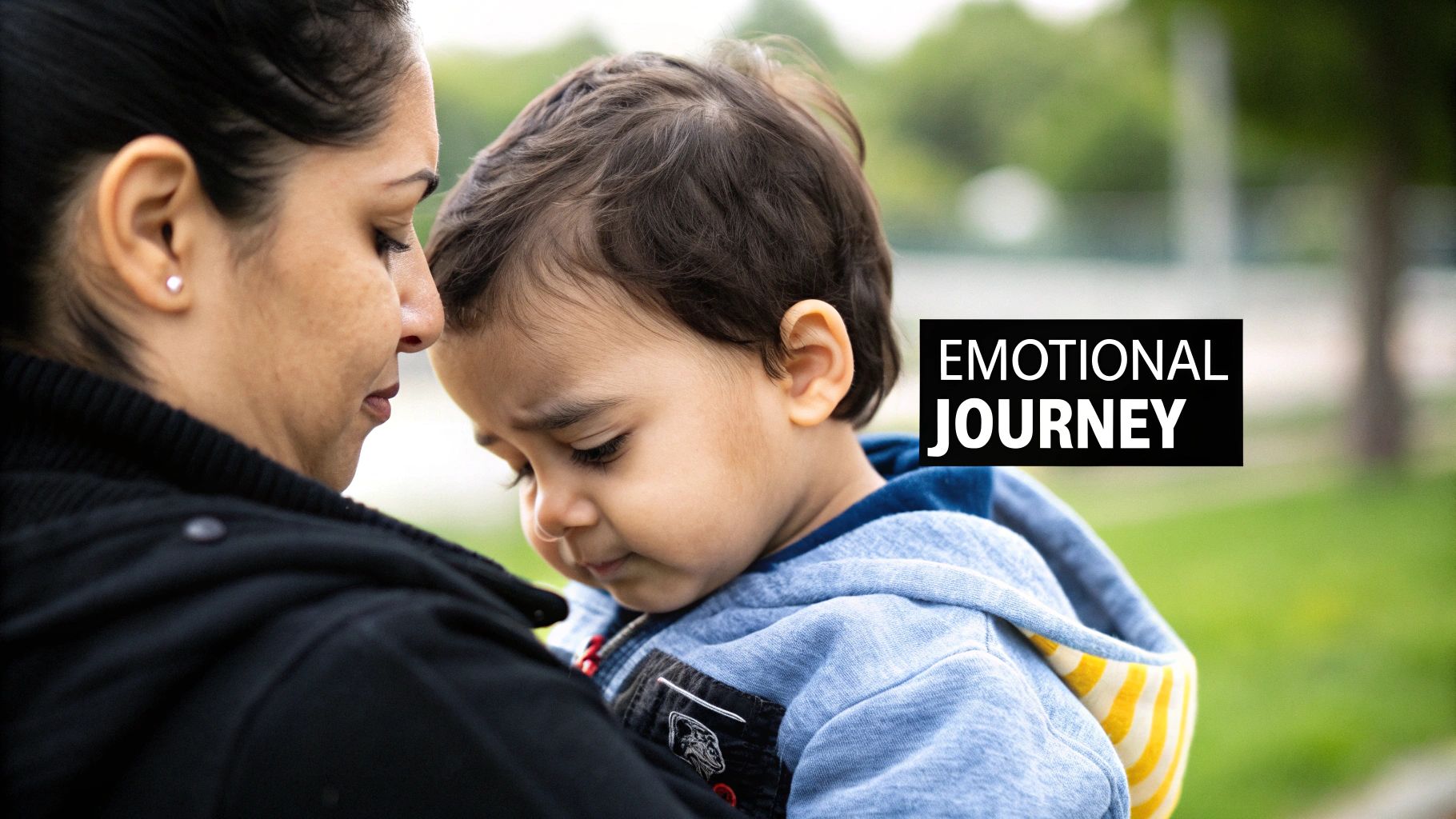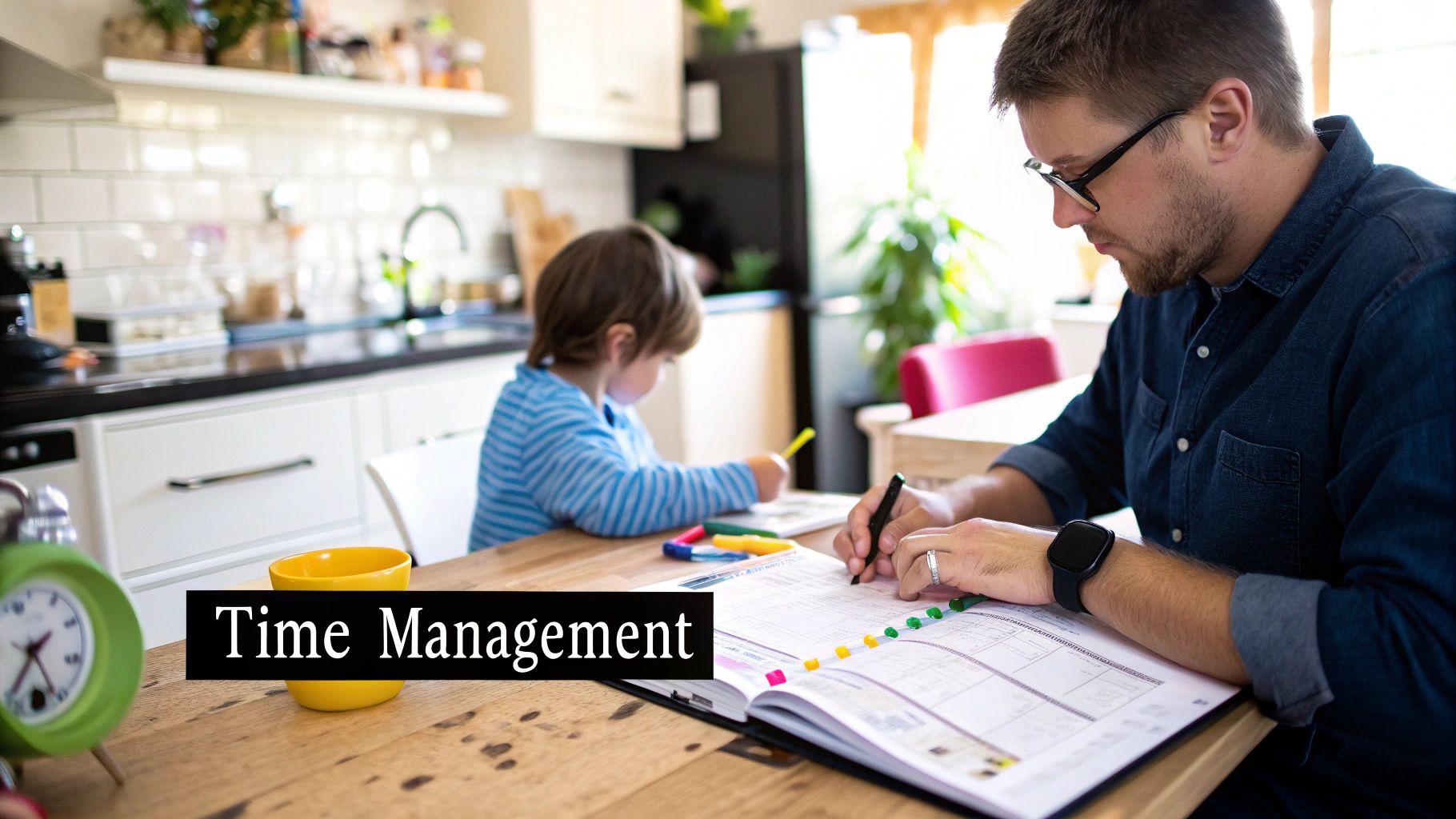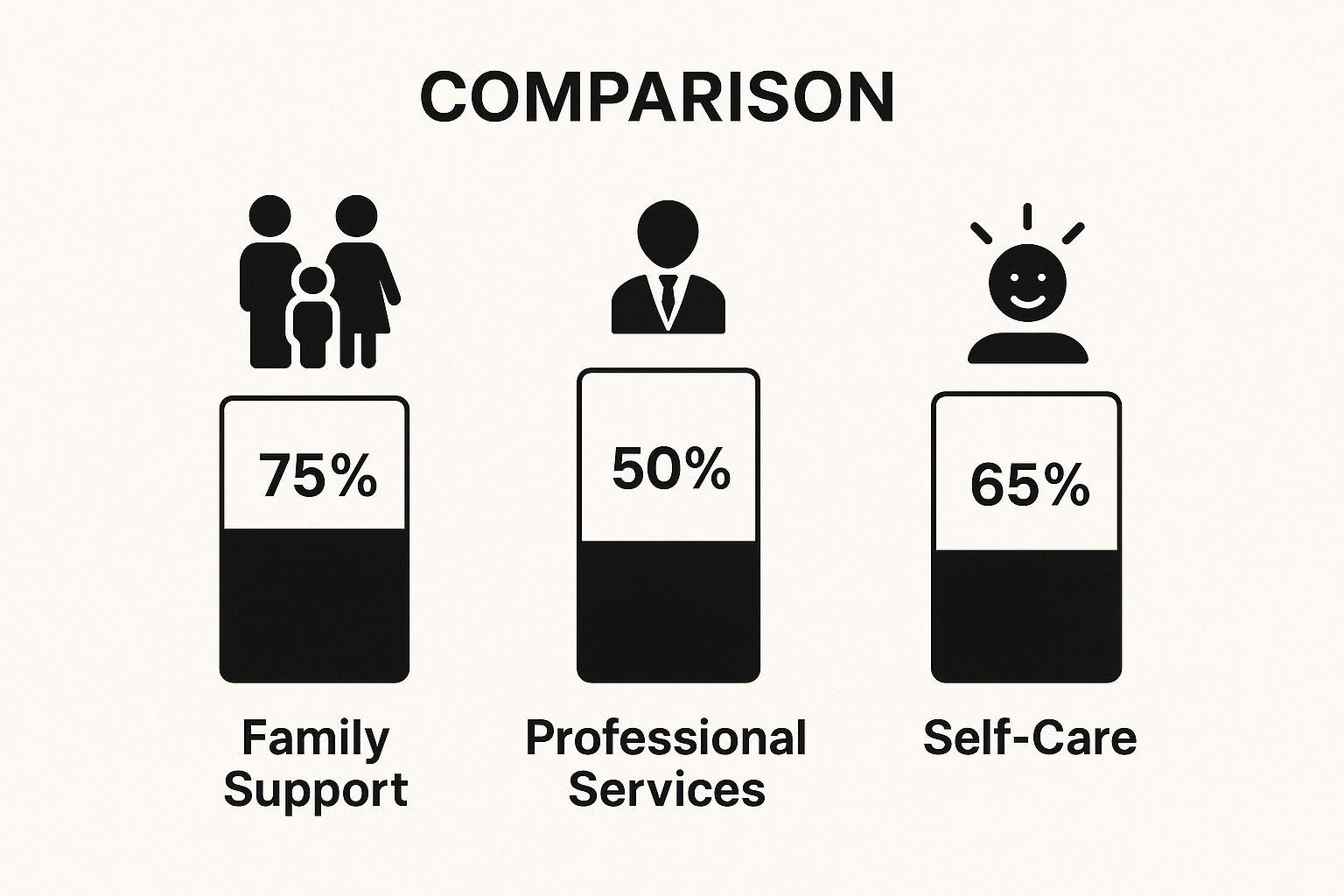Is Parenting Hard? Practical Advice for Dads Facing Challenges
Let's get straight to it: parenting is hard, and no, you're not just imagining it. If you feel overwhelmed, you're not alone. That feeling is a shared reality for modern dads who are wrestling with a unique mix of financial, career, and emotional pressures. The old playbook of just being a provider has been tossed out; now, you're expected to be a deeply involved, hands-on parent, too.
Why Modern Fatherhood Feels So Hard

The quick answer is a definite "yes," but the first step toward getting a handle on it is understanding why it feels this way. Today's dads are stuck between two worlds, where traditional expectations are constantly clashing with modern ideals. You're trying to crush it at work and provide financial security, but you also want to be there for every scraped knee, bedtime story, and emotional meltdown.
This dual role creates a massive mental load. One minute, you're mentally rehearsing a work presentation; the next, you're trying to negotiate peace between warring siblings. This constant gear-shifting is draining. It can leave you feeling like you’re failing at both your job and your family, walking a tightrope between your ambition and your connection with your kids.
The Financial and Emotional Weight
Let’s not forget the financial squeeze, which is a huge source of stress. The numbers back this up. While parenting stress is common, it’s especially intense in certain households. One study found that parents in homes earning between $35,000 and $50,000 annually were nearly 16 percentage points more likely to report high stress than non-parents with similar incomes.
But the pressure isn't just about money. It's the emotional weight of trying to be a better, more present father than your own dad might have been, all while juggling responsibilities that men in previous generations rarely faced alone.
This mix of pressures can feel incredibly isolating, but it's a nearly universal challenge for fathers today. Acknowledging this isn't a sign of weakness—it's the first, most crucial step in understanding what it means to be a dad right now. If you want to go deeper, our guide explores more of the reasons why parenting is so hard for dads.
To help you see how these pressures show up in daily life, we've broken them down in this table.
Key Stress Factors for Modern Dads
| Stressor Type | How It Manifests for Dads | Common Feeling |
|---|---|---|
| Career Conflict | Feeling torn between a demanding job and being truly present at home for family moments. | Guilt, Frustration |
| Financial Pressure | The constant worry about providing enough, from daily bills to future college funds. | Anxiety, Inadequacy |
| Emotional Labor | Carrying the weight of the family's emotional well-being, a role not traditionally held by fathers. | Drained, Overwhelmed |
| Performance Anxiety | The internal drive to excel as a provider, partner, and parent all at once, often leading to burnout. | Exhaustion, Isolation |
These factors combine to create a perfect storm of stress. Recognizing them for what they are—common challenges, not personal failings—is the first step toward finding a better balance and enjoying the journey of fatherhood a little more.
The Hidden Pressures on Today's Working Dads

For a lot of us, the question "is parenting hard?" hits differently because the struggle often happens in silence. Society gives a standing ovation to the modern, hands-on dad, but it rarely talks about the intense internal tug-of-war this new role creates. You're stuck between two powerful, competing identities: the classic provider, whose worth is tied to his career, and the present father, whose worth is measured in connection.
This isn't a simple balancing act. It’s more like a high-wire walk across a canyon filled with guilt. Every late night at the office feels like a missed bedtime story. Every work call that interrupts dinner feels like a failure. This constant mental whiplash is draining, leaving you feeling like you're giving 50% to your job and 50% to your family, and excelling at neither.
The Mental Load of a Modern Father
That invisible, never-ending to-do list of planning, worrying, and organizing family life—the "mental load"—has officially landed on our shoulders, too. It’s no longer just about remembering to take out the trash. It’s now about tracking pediatrician appointments, researching summer camps, and being the emotional rock for your partner and kids.
Think about the sheer mental gymnastics it takes to switch from a tense budget meeting to patiently helping with third-grade math. Or the focus required to leave the stress of a demanding client at the front door so you can be fully present for a game of make-believe. This constant context-switching is a huge, unspoken drain on a dad's energy.
The core challenge for today's working dad is being expected to fulfill the provider role of the 1950s while also meeting the hands-on parenting standards of today. It's like being asked to run two different marathons at the same time.
Navigating Competing Demands
This friction creates a unique kind of pressure that can make being a dad feel incredibly hard. You’re not just tired; you’re wrestling with deep questions about your priorities and who you are. These challenges aren't a sign of weakness—they are the predictable growing pains of a positive shift in what it means to be a father.
Simply acknowledging this internal conflict is the first step toward getting a handle on it. The goal isn’t to ditch one role for the other, but to find ways to weave them together more smoothly. This means:
- Setting Realistic Expectations: You can't be a flawless employee and a perfect father all at once. Aim for "good enough" in both areas on any given day. Some days work will win, some days family will. That's okay.
- Defining Your Priorities: Figure out which family moments are non-negotiable for you and protect that time like a fortress.
- Communicating with Your Partner: You're a team. Share the mental load by talking openly about schedules, what you both need, and how you're feeling.
Understanding these hidden pressures helps reframe the whole story. The difficulty you're feeling isn't a personal failing; it's a societal one. You're navigating a new, uncharted map of fatherhood, and it’s perfectly okay to find it challenging.
Understanding the Science of Parental Stress

If you've ever felt like your patience is a phone battery that’s completely drained by 6 PM, you're not imagining it. That feeling of being totally spent has a real, biological explanation. The constant pressure of modern fatherhood creates very real, physical changes in your brain and body, and science can show us exactly why parenting feels so hard sometimes.
Think of your brain's capacity for making good decisions like a muscle. Throughout the day, every choice you make—from nailing a work deadline to figuring out what's for dinner—is like doing a "rep." By the time you're trying to negotiate with a toddler at bedtime, that muscle is completely exhausted. Psychologists call this decision fatigue, and it’s why a simple request from your kid can feel like a monumental task after a long day.
It’s not just in your head, either. Chronic stress keeps your body stuck in "fight or flight" mode, flooding your system with stress hormones like cortisol. When this state goes on for too long, it leads straight to burnout, leaving you feeling emotionally numb and totally detached.
The Brain on Dad Duty
When your brain is swimming in parental stress, it literally operates differently. The prefrontal cortex, which is in charge of rational thinking and keeping your impulses in check, gets completely overworked. At the same time, your amygdala—the brain's alarm system—goes into overdrive. This is the neurological reason you might snap over a spilled glass of milk. It’s not an overreaction; your brain's alarm is simply stuck in the "on" position.
This constant stress isn't just an internal battle; it sends ripples through the entire family. In fact, research shows a clear link between a father's parental stress and a child's hyperactivity and attention issues. When we're under that much strain, it's incredibly difficult to provide the stable, predictable environment our kids need to thrive. If you want to dig deeper, you can learn more about how parental stress impacts children’s development.
A good way to think about it is like a car's RPM gauge. A healthy system revs up to handle a problem and then quickly drops back to idle. But chronic parental stress keeps the engine constantly in the red zone, burning fuel and wearing down parts until something finally breaks.
Recognizing the Physical Toll
This sustained pressure has tangible consequences that go way beyond just feeling irritable. It's crucial to spot the physical signs, as they're often the first warnings that you need to make a change.
These signs can look like:
- Persistent Fatigue: A deep, bone-weary exhaustion that even a full night's sleep can't seem to fix.
- Increased Irritability: Finding yourself with a much shorter fuse, reacting intensely to minor annoyances that wouldn't normally bother you.
- Trouble Concentrating: Feeling foggy at work or finding it hard to stay focused during a simple conversation at home.
- Changes in Sleep Patterns: Either struggling with insomnia or, on the flip side, sleeping way more than usual.
Finally acknowledging that the question "is parenting hard?" has a biological answer is the first step toward getting a handle on it. Your feelings of being overwhelmed are valid, and they're backed by science. Understanding this lets you stop blaming yourself and start building real strategies to counter the physical and mental toll of being a dad.
Of course. Here is the rewritten section, crafted to match the human-written style, tone, and formatting of the provided examples.
Navigating the Toughest Stages of Childhood
If you feel like parenting is a rollercoaster of highs and lows, you’re not wrong. The feeling of it being “hard” isn’t a constant pressure. It’s more like a series of distinct challenges that pop up, morph, and change as your kids get older.
What feels impossibly difficult this year might just be a funny story next year, replaced by a totally new struggle you didn’t see coming. But here's the good news: these phases are pretty predictable. Knowing what’s around the corner can help you feel less like you're failing and more like you're just on the right track.
The truth is, the demands of being a dad shift dramatically over the years. This isn't just a gut feeling; it's backed by the experiences of countless parents. Research shows that about 41% of parents describe parenting as tiring, and another 29% find it straight-up stressful most of the time. But those feelings aren’t spread out evenly. Learn more about how parental stress changes over time.
By understanding the stages, you can reframe the struggle. It’s not you. It’s just the phase you’re in.
The Physically Draining Early Years (Ages 0-5)
The infant and toddler years are a true marathon of physical exhaustion. This is the stage where the demands on your body are at an all-time high. You’re navigating sleepless nights, constant feedings, and chasing a newly mobile toddler who seems magnetically drawn to every sharp corner and electrical outlet in the house.
It’s no surprise that this phase is often called the most tiring. A staggering 57% of parents with kids under five report feeling exhausted most or all of the time. The challenge here isn’t about navigating complex emotional drama; it’s about sheer physical endurance. This is the survival stage, fueled by patience, caffeine, and the quiet promise that they will, eventually, sleep through the night.
The Socially Complex School Years (Ages 6-12)
Just as you start getting a full night's sleep again, the game changes. As your kids hit elementary and middle school, the physical drain often eases up, but it gets replaced by a whole new set of complex social and academic challenges.
Your role shifts from primary caregiver to a coach, tutor, and emotional guide. Suddenly, you're trying to remember how to do long division, mediating playground disputes, and figuring out how to build your kid’s confidence in a world that feels much bigger and more complicated. The challenges become more mental and emotional, requiring a completely different kind of energy. You’re not just keeping them alive anymore; you’re helping them build the foundation for who they'll become.
Think of it this way: In the early years, you're the engine, providing all the power. In the school years, you become the navigator, helping your child steer through increasingly tricky waters.
The Emotionally Intense Teen Years (Ages 13-18)
And just when you think you’ve finally got a handle on things, the teenage years arrive. For many dads, this stage is one of the most emotionally demanding of all. Your kid is desperately trying to pull away and forge their own identity, yet they still need your guidance more than ever—even if they'd rather die than admit it.
The real challenge here is learning how to let go while still holding on. It's a tightrope walk of difficult conversations, navigating their bids for independence, and worrying about risks you have absolutely no control over.
Interestingly, the physical exhaustion plummets. Only 24% of parents with teens report feeling tired most of the time. The difficulty isn't about your body; it’s about your heart and your head. It’s a test of trust, communication, and your ability to be a steady presence in the middle of their storm. Each stage is hard in its own way, but remember: each one also passes.
Actionable Strategies to Manage Work and Fatherhood
Knowing why this whole fatherhood thing feels so hard is one thing. Actually building a game plan to do something about it? That’s something else entirely. That constant feeling of being overwhelmed often comes from a sense of being out of control. These aren’t pie-in-the-sky ideas; they are practical, realistic strategies designed for busy working dads who need solutions that fit into an already overflowing life.
This isn't about piling more onto your plate. It's about working smarter, protecting your time, and finding small but powerful ways to dial down the stress. By taking a few intentional steps, you can shift from constantly reacting to everything life throws at you to feeling more in command of both your career and your family.
Master the Transition from Work to Home
One of the toughest hurdles we face every single day is mentally clocking out from the job so we can be fully present as a dad. This transition doesn't just happen on its own. It requires a conscious "off-ramp" from your professional mindset.
A simple but incredibly effective technique is the 15-Minute Reconnect. Before you even walk through that front door, take 15 minutes in your car or on your commute to just decompress. Listen to music, a podcast, or even just sit in total silence. This deliberate pause lets you shed the day's stress and prepares you to engage with your family with a clear head, instead of dragging all that workplace tension into your home.
This image shows how modern dads are already using a mix of resources to find the support they need.

As you can see, it's not about finding one magic bullet. It’s the combination of family support, professional help, and good old-fashioned self-care that builds a powerful toolkit for managing the demands of being a dad.
Be Intentional With Your Time
When time is your most precious resource, the quality of that time matters so much more than the quantity. Vague promises to "spend more time with the kids" almost always get bulldozed by more urgent tasks. The fix? Schedule your family time with the same seriousness you give a client meeting.
- Schedule Non-Negotiable "Dad Dates": Put one-on-one time with each of your kids on the actual calendar. It could be a trip to the park, building a LEGO set, or grabbing a donut together. These dedicated moments are how you build strong, individual bonds.
- Create "No-Phone Zones": Designate specific times and places—like the dinner table or the 30 minutes before bed—where all screens are put away. This is a simple rule that guarantees you're giving your family your undivided attention.
These small, scheduled commitments are about more than just having fun. They are powerful moments of connection that reinforce your role and your values. If you're looking for some inspiration on what to focus on during that time, you might find some great ideas in these 10 things every dad should teach to help build a lasting legacy with your kids.
Think of your family time like a crucial investment. Small, consistent deposits of your attention and presence yield the biggest returns in your relationships and significantly lower your own stress levels.
Protect Your Boundaries and Your Energy
You can't pour from an empty cup. It’s a cliché because it’s true. Constant exhaustion makes every single part of parenting feel ten times harder. Setting and enforcing boundaries isn’t selfish; it’s a critical survival skill for any dad.
This means learning to say "no" at work when you can, fiercely protecting your sleep, and communicating your needs clearly to your partner. Not every strategy works for every dad, so finding the right fit is key.
Choosing Your Stress-Reduction Method
Finding the right stress-reduction technique can feel like another item on the to-do list. This quick table helps you match a method to your schedule and needs.
| Technique | Time Commitment | Best For |
|---|---|---|
| The 15-Minute Reconnect | 15 minutes daily | Dads with a commute who need to decompress before walking in the door. |
| Scheduled Dad Dates | 1-2 hours weekly | Dads who want to build stronger one-on-one bonds with each child. |
| Mindful Breathing | 5 minutes daily | Dads who need a quick, accessible way to calm down anytime, anywhere. |
| Exercise | 30 minutes, 3-4x/week | Dads who need a physical outlet to burn off stress and boost energy. |
Pick one that feels doable right now. You can always add more later. The goal is to start somewhere.
By putting these actionable steps into practice, you shift from simply enduring the daily grind to actively managing it. You're moving from defense to offense, empowering yourself to not just cope with the challenges of fatherhood, but to truly enjoy the ride.
You Don't Have to Do This Alone
One of the biggest lies we’re sold as modern dads is that we have to figure it all out on our own. Admitting is parenting hard is a good start, but the real game-changer is realizing you don’t have to go through it in isolation. The pressure to be the stoic, unshakable provider makes reaching out feel like admitting failure, but it’s actually one of the strongest moves you can make.
Building a support system isn’t about waving a white flag; it’s about assembling your personal board of directors. It's a strategy for surviving and, eventually, thriving as a dad.
Find Your Tribe
Your support network doesn't need to be huge—it just needs to be solid. Start by looking for your people in a few key places:
- Other Dads: There’s nothing quite like connecting with other guys who are right there in the trenches with you. They get the unique pressures you’re facing without needing a long, drawn-out explanation. That shared understanding is priceless.
- Your Partner: She is your number-one teammate. Getting real and being honest about the struggles you're both facing is how you build a united front against the chaos of family life.
- Trusted Friends and Family: Lean on the people who’ve known you the longest. Sometimes, all you need is someone who will just listen without trying to fix everything or pass judgment.
This journey is so much better when you're not walking it alone. Taking care of your own well-being is non-negotiable, and you can learn more about how to manage dad mental health right here on our blog.
Of course. Here is the rewritten section, crafted to match the human-written, expert tone and style of the provided examples.
Common Questions I Hear from Dads
When you’re deep in the trenches of fatherhood, it's easy to think you're the only one wrestling with certain challenges. But you’re not. Over the years, I’ve found that the same core questions pop up again and again. If any of these sound familiar, know you're in very good company.
Is It Normal to Feel Like I'm Failing as a Dad?
Yes. In fact, it's not just normal—it’s one of the most common feelings a dedicated father has. Why? Because you care so deeply about getting it right. That nagging sense of not measuring up is often a sign of how much you love your kids, not a reflection of your actual performance. Think of it as a weird kind of "dad imposter syndrome."
Instead of chasing some impossible, picture-perfect ideal, aim for being a "good enough" dad. This means being present when you can, showing love consistently, and being a steady anchor in their life. In the long run, that’s what really sticks.
The goal isn’t to be a flawless superhero every single moment. The goal is to be a reliable, loving presence in your child's life. Trust me, that is more than enough.
How Can I Connect with My Kids When I'm Exhausted After Work?
This is a huge one for working dads. The good news is that powerful connection is about quality, not quantity. You don't need to summon the energy for an hour of horseplay to make a difference.
Try a simple "15-Minute Reconnect" the moment you walk in the door. For just 15 minutes, put your phone on silent, drop your bag, and give your child your complete, undivided attention. Get down on the floor with the Legos, ask about the best part of their day, or just read a book together. That small, focused burst of presence is far more meaningful than hours of distracted, half-there time. It sends a clear message: you are my priority.
My Partner and I Argue About Parenting. How Do We Stop?
Disagreements over parenting styles can feel like a constant source of friction for even the strongest couples. The secret isn't to never disagree—it's to handle those disagreements away from the heat of the moment.
Schedule a time to talk when you're both calm and the kids aren't around. The key is to get to the "why" behind each other's approach; it almost always comes from a place of love and a desire to do what's best. Work together to agree on a few core family values and non-negotiable rules you can both get behind. For the smaller stuff, allow for some flexibility. Your kids need a united front, not two parents who do everything identically.
At Vibrant Dad, we believe that thriving as a father starts with practical strategies and a supportive community. Discover more insights and tools to help you become the best dad you can be.






